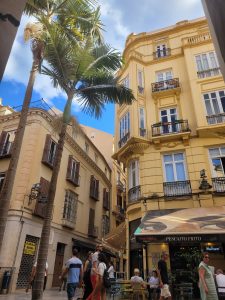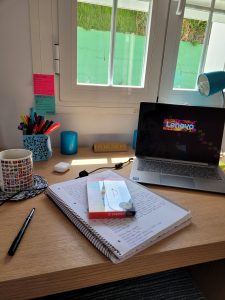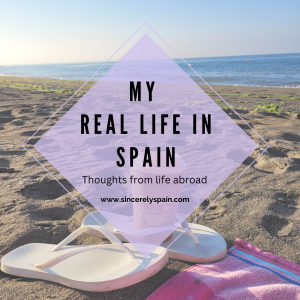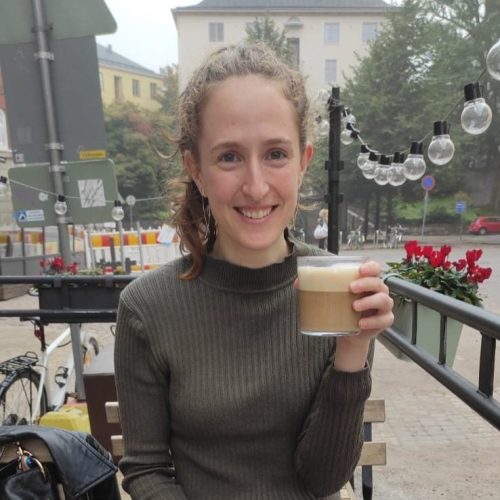
My Real Life in Spain
Dear Melanie,
Five years ago, Dani wrote a guest post for another blog about her “real life in Spain.” Oftentimes, we find that people differentiate between time spent abroad and ‘real life,’ which can become all the more confusing when someone lives abroad long-term, like we do.
Furthermore, this concept of ‘real life’ and what it actually entails is something Dani’s been contemplating for a long time and so, while the original post is no longer available, we felt it was time she updated and shared these thoughts again. In order to do so, Dani’s had to tackle some pretty high-level questions that are very specific to her, so in the rest of this post, she will be speaking directly for herself.
 Why did this post feel necessary in the first place?
Why did this post feel necessary in the first place?
Before I get around to explaining what my “real life in Spain” looks like now, it feels essential to explore the significance behind writing this post in the first place. Seeing as I’ve lived my life in Spain permanently since 2015, isn’t it obvious that this is my real life? The answer is yes and no.
On one hand, I’ve been aware for years that this is my ‘real life.’ At first, my need to articulate ‘real life’ when I talk about living in Spain was because I had a fear that other people wouldn’t necessarily see it that way. (Whether or not this is an actual perspective others have is another question entirely, but suffice it to say that my use of this term stemmed from thinking it is.) However, there’s more to it than that.
Back in college, I did a study abroad semester in Alicante, Spain and directly after graduating I returned to Granada to complete a year-long Teach-in-Spain program. In both instances, it felt like something contained and temporary. My time in Spain was viewed as a means-to-an-end. The first time, it represented the fulfillment of a prerequisite for my major; the second time it represented a rite of passage (like a “gap year” before deciding what to do with the rest of my life).
The longer I’ve spent in Spain since then, the less I felt this way about my time here. It was, outwardly, difficult to convey to my family and friends what had changed. Perhaps more importantly, it was difficult for me to make the mental leap. I once considered my Spanish life to be a once-in-a-lifetime experience; now I consider it my everyday reality. It can be difficult to reconcile these two sides of the same coin.
On the surface level, I wrote about the topic of my “real life in Spain” because I longed for others to understand the complexities of my expat life. On a deeper level, I now see, it was also because I needed a way to come to terms with these complexities myself.
Before moving abroad to Spain, what did I think ‘real life’ meant?
 In truth, my own interpretation of ‘real life’ is much to blame for why I’ve struggled to reconcile what “real life in Spain” means for me. I seem to have this conception that “the rest of the world” believes you can only do ‘real life’ a certain way. And that way is certainly not the way I’m doing life.
In truth, my own interpretation of ‘real life’ is much to blame for why I’ve struggled to reconcile what “real life in Spain” means for me. I seem to have this conception that “the rest of the world” believes you can only do ‘real life’ a certain way. And that way is certainly not the way I’m doing life.
Growing up in the USA (at least in my experience) means it’s pretty normal to think you have to get a college degree, start working as soon as possible, and perhaps work a job you don’t really enjoy just so you can afford your student loans, an apartment in the city center, and normal living expenses. I’m lucky to know a lot of people who seem much happier than that—and I credit this to the fact that our generation has been changing this narrative.
Still, in general, I would say that the narrative continues to be that ‘real life’ requires hard work. That belief, in and of itself, is one I’m not necessarily opposed to. The complication, however, is that by valuing hard work, we often end up glamorizing struggling, busy-ness, and unhappiness. Without realizing it, we treat unhealthy work-life balance as a badge of honor.
For these reasons, I’ve often felt that living in a country where the work-to-live mentality generally outweighs the live-to-work mentality makes my life somehow ‘less real’ than the lives of my peers in the USA. I’ve not only felt guilty for being happy, but I’ve also felt that anytime I am feeling content with what I’m doing, it directly negates any argument that this is my ‘real life.’ It sounds rather unreasonable when I lay it out objectively like this, I know.
Still, I do now believe that my beliefs that ‘real life’ and ‘adulting’ have to be difficult are what have held me back from feeling like my life in Spain is ‘real life.’
In spite of all this, deep down I know that I am leading a ‘real life’ and ‘adulting’ just as much as everyone else…and therein lies the disconnect. I struggle to see how my life in Spain can possibly look ‘real’ to others, but I desperately want it to be treated as such.
What does my “real life in Spain” look like?
 The life I lead now looks quite different to life in Spain when I was here with study abroad and teach abroad program experiences. Back then, there were clear end-dates involved and I was generally surrounded by other people in the exact same boat.
The life I lead now looks quite different to life in Spain when I was here with study abroad and teach abroad program experiences. Back then, there were clear end-dates involved and I was generally surrounded by other people in the exact same boat.
Thus, it was much easier then to find someone going through the same emotions and thought-processes as me, from the acclimation period at the start to the last hurrah mentality at the end. We were all on a mission to live everyday to the fullest and experience all that Spain had to offer.
Now that my life is no longer dictated by a program with an end-date, things feel much more open-ended—for better and for worse. Making friends requires a lot more effort (as I discussed in my recent ‘friend dating’ post), but it can also result in connecting with people I have far more in common with. With perseverance, I’m able to create friendships that are more likely to last, because I and the people I’m meeting are planning to stick around.
As a long-term resident of Spain, I’ve also become more willing to pursue the things that deeply interest me, not only the things that are unique to Spain. When I believed I’d only live here for a limited time, I wanted to “make the most” of my time and pushed myself to seek out cultural experiences and Spanish-language events that I wouldn’t have the opportunity to participate in otherwise.
Sometimes, I now feel guilty that many of the ways I spend my time in Spain involve speaking English and have nothing to do with Spanish culture. However, the flipside of that truth is that I’m now seeking out experiences that resonate with what I’m most interested in, not just saying yes to everything because that was a tip I received when I first studied abroad.
 For the record, I still think that’s great advice that will have you breaking out of your comfort zone during a short-term live abroad experience. Personally, though, doing that for the rest of my life doesn’t feel authentic to who I am. Adjusting to what I call my “real life in Spain” has meant taking all the advice and best intentions of my early years in Spain and adapting them to better fit what I want for myself long-term.
For the record, I still think that’s great advice that will have you breaking out of your comfort zone during a short-term live abroad experience. Personally, though, doing that for the rest of my life doesn’t feel authentic to who I am. Adjusting to what I call my “real life in Spain” has meant taking all the advice and best intentions of my early years in Spain and adapting them to better fit what I want for myself long-term.
Sometimes, my life in Spain still looks and feels like the dream that expat life seems like on social media. Most of the time, though, I’m just living ‘real life.’ My days are filled with working on my author business, trying to work out and eat well, doing laundry and grocery shopping—all the typical adult stuff everyone gets up. And, sure, I have to switch into Spanish the moment I get a phone call, receive a delivery, or meet up with a Spanish friend, but otherwise my days are pretty normal.
Perhaps one of the biggest shifts that’s made my life abroad feel like my ‘real life’ is that I now focus and spend more time on the mundane and routine parts of my life in Spain than on the out-of-the-ordinary parts. Sometimes the routine feels difficult, and sometimes it does not. Both sides can exist, which is a beautiful thing.
What do I believe is ‘real life’ now, as I live my “real life in Spain”?
 Honestly, my feelings about ‘real life’ now lie somewhere in the middle. Yes, ‘real life’ comes with its struggles and it involves those ‘adulting’ tasks that no one really enjoys doing (like taxes, home maintenance, financial planning, and bureaucracy, to name a few). However, it can (and should) also involve beautiful moments, realizing your dreams, and finding joy in the everyday.
Honestly, my feelings about ‘real life’ now lie somewhere in the middle. Yes, ‘real life’ comes with its struggles and it involves those ‘adulting’ tasks that no one really enjoys doing (like taxes, home maintenance, financial planning, and bureaucracy, to name a few). However, it can (and should) also involve beautiful moments, realizing your dreams, and finding joy in the everyday.
I am over the closed-minded, cynical beliefs that a part of ‘real life’ is being unhappy. That ‘adulting’ is synonymous with selling out and forgetting about your ‘childish’ dreams. Living in Spain was once a crazy dream of mine, but I turned it into a reality. My life is filled with fairytale moments…but also headaches. ‘Real life’ always comes with highs and lows and that doesn’t change simply because I call Spain my home.
I now believe the healthiest way of going about ‘real life’ is to do so with the wisdom of an adult, without losing the joy of a child. That’s what my “real life in Spain”—and all the growth I’ve undergone as a result of it—has taught me. As you can see from this post, I have a lot of mixed feelings when it comes to this topic and it can be difficult to appreciate all of them without feeling like they conflict with each other.
Perhaps another way of describing what makes my life in Spain now feel like my ‘real life’ is to say that Spain is now the setting of my story, not the main plotline. It remains an important factor, but it is not at the heart of everything I do. Instead, the driving force behind my daily actions is the desire to live my life in the way that feels right for me.
Sincerely,
Dani




